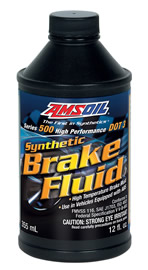|
|







































Search Our Site




 |
|
|
|
Series 600
DOT 3 Racing Brake Fluid
|
|

Click image to enlarge

Product Code: BF3 |
AMSOIL Series 500 DOT 4
High-Performance Synthetic Brake Fluid and AMSOIL Series 600 DOT
4 Synthetic Racing Brake Fluid feature pure base stocks and robust
additives that resist boil-off and the effects of water
contamination more effectively than conventional brake fluids.
AMSOIL Synthetic Brake Fluids deliver superior high-temperature
performance in auto/light-truck, high-performance, racing and
powersports applications.
Package sizes include:
|
|
|
Contamination
Water contaminates the brake system by seeping through microscopic
pores in flexible brake lines and seals and through the reservoir
fill cap when opened. Once inside, it quickly works to corrode brake
parts, lines and seals, leading to eventual system failure. AMSOIL
Synthetic Brake Fluids keep water in suspension, slowing its
corroding effects. They lubricate and protect intricate braking
components despite the inevitable water absorption associated with
braking systems, delivering long-lasting performance.
|
|
|
Boil-Off The extreme pressure and high heat common to braking can
push conventional brake fluid beyond its boiling point, causing it
to vaporize, or �boil-off.� Even more problematic, water
contamination can drop the boiling point of conventional fluid below
safe standards, accelerating the rate at which it boils off. This
leads to a spongy or unresponsive feeling in the brake pedal. In
contrast, the unique chemistry behind AMSOIL Synthetic Brake Fluids
increase their boiling point temperatures well beyond Department of
Transportation (DOT) standards even when contaminated with 3.7
percent water (see chart). They maintain a stable viscosity over a
wide temperature range and flow easily at the high pressures
generated in today's automotive brake systems to deliver consistent,
safe braking. AMSOIL Series 600 DOT 4 Synthetic Racing Brake Fluid
features a wet equilibrium reflux boiling point (Wet ERBP) nearly
100°F higher than the DOT minimum, making it ideal for
high-performance cars, motorcycles and vehicles used for towing.
| |
DOT Minimum
|
AMSOIL
|
DOT3
ERBP*: |
205°C (401°F)
|
271°C (520°F)
|
| Wet ERBP**: |
140°C (284°F)
|
151°C (304°F)
|
DOT4
ERBP*: |
230°C (446°F)
|
304°C (580°F)
|
| Wet ERBP**: |
155°C (311°F)
|
193°C (379°F)
|
*Dry equilibrium reflux boiling point (ERBP)–the
boiling point of new, freshly opened brake fluid.
**Wet ERBP–the boiling point of brake fluid having absorbed 3.7
percent water. Only 3.7 percent water contamination is often
sufficient to reduce a DOT 3 fluid’s boiling point below the DOT
minimum.
|
Typical Technical Properties
|
|
AMSOIL Series 500 DOT 3 High Performance Synthetic Brake
Fluid and AMSOIL Series 600 DOT 4 Racing Synthetic Brake
Fluid
|
Equilibrium Reflux Boiling Point
Dry °C (°F)
Wet °C (°F) |
271 (520)
151 (304) |
304 (580)
193 (379) |
Viscosity
-40°C
(-40°F), cSt
100°C (212°F), cSt |
1065
2.0 |
1550
2.0 |
| pH |
9.0 |
7.2 |
|
|
|
Powersports
The aggressive driving conditions and sudden stops common to some
on- and off-road motorcycle and ATV applications can literally boil
conventional brake fluid, leaving behind a discolored, dirty
solution that can promote deposit formation and corrosion on braking
components. Worn brake fluid also fails to deliver adequate
protection against water ingress common to powersports equipment
exposed to the elements.
The synthetic base stocks and superior
additives in AMSOIL Synthetic Brake Fluids excel in demanding
powersports applications, providing reliable brake lever and pedal
response, corrosion protection and longevity as compared to
conventional brake fluids. AMSOIL Synthetic Brake Fluids are the
product of choice for racing, heavy hauling or leisure powersports
applications.
|
|
Applications
Refer to your owner's manual regarding the proper change interval
for your brake fluid. If no information is available, AMSOIL
recommends changing DOT 4 brake fluid every two years. DOT 3 brake
fluids typically have a longer life span, so be sure to follow the
vehicle manufacturer’s recommended change interval.
To determine
the correct DOT classification for powersports applications, consult
your owner’s manual.
|
|
|
|

